If you have a fast, stable internet connection of around 25 Mbps or higher, 4K streaming offers stunning visuals with rich colors and sharp details, making it well worth the extra bandwidth. However, it consumes about 7 GB per hour, which can quickly impact data caps and increase costs. To decide if it’s right for you, consider your device compatibility and viewing habits—more details await if you continue forward.
Key Takeaways
- 4K streaming offers sharper images, richer colors, and a more immersive viewing experience, especially on large screens.
- It consumes approximately 7 GB of data per hour, which can quickly impact data caps and increase costs.
- Devices must support 4K resolution and have compatible hardware like HDMI 2.0 or newer for optimal playback.
- Reliable internet speeds of at least 25 Mbps are essential to avoid buffering and ensure smooth 4K streaming.
- Consider your viewing habits and bandwidth limits to determine if the enhanced quality justifies the extra data and potential costs.
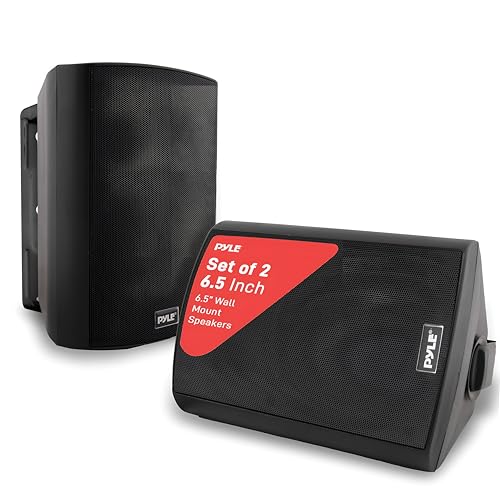
Pyle 6.5-Inch Wall Mount Waterproof Bluetooth Speaker System – Indoor/Outdoor Audio Pair with Built-in Digital Amplifier, Weather-Resistant Housing, High-Power Sound, Easy Installation (Black)
Includes (2) Speakers (Active & Passive Speaker System) - Marine Grade Waterproof Construction.Mounting Type:Wall Mount.Speakers maximum output power:300...
As an affiliate, we earn on qualifying purchases.
The Visual Benefits of 4K Content
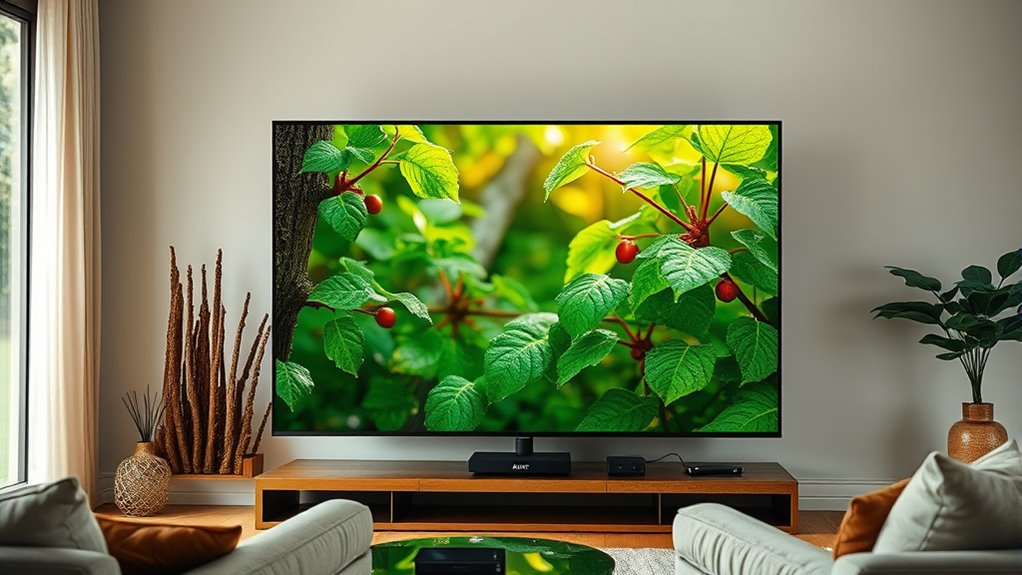
When you watch 4K content, you immediately notice the sharper details and richer colors that standard HD simply can’t match. This superior visual quality stems from increased screen resolution, offering four times the pixel count of HD. Thanks to advances in video compression, 4K streams can deliver stunning clarity without overly taxing your internet connection. The higher resolution reveals finer textures and subtle nuances, making scenes more lifelike and immersive. Colors appear more vibrant and realistic, pulling you deeper into the content. Overall, 4K enhances your viewing experience by providing crisp, detailed images and richer visuals. While it demands more bandwidth, the payoff is a considerably more engaging and visually impressive experience that standard HD just can’t deliver.

Official Licensed Google TV Smart Projector, HAPPRUN 4K UHD Home Theater with Dolby Sound, Wi-Fi & Bluetooth, Built-in Streaming Apps, Compatible with Games Consoles & Smartphone, Indoor & Outdoor Use
[ Built-in Official Licensed Google TV ] - Without additional equipment, the smart projector can directly access Netflix,...
As an affiliate, we earn on qualifying purchases.
How Much Bandwidth Does 4K Streaming Consume?
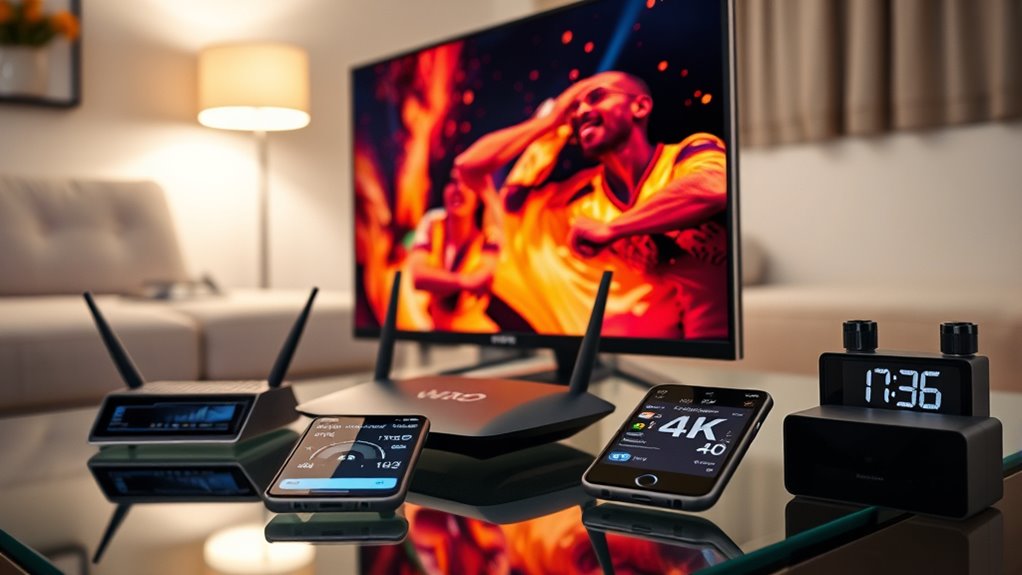
4K streaming requires substantially more bandwidth than standard HD, making it important to understand how much data your internet connection needs to handle it smoothly. Typically, streaming services recommend around 25 Mbps for 4K content, but actual bandwidth use varies. To improve bandwidth efficiency and streaming optimization, consider the table below:
| Streaming Service | Recommended Mbps | Typical Data Usage per Hour |
|---|---|---|
| Netflix | 25 Mbps | 7 GB |
| Amazon Prime | 25 Mbps | 8 GB |
| Disney+ | 25 Mbps | 7.5 GB |
| Hulu | 25 Mbps | 7 GB |
| YouTube | 20-25 Mbps | 6-8 GB |
Knowing these numbers helps you manage your bandwidth effectively and decide if your connection can sustain high-quality 4K streaming. Additionally, video compression techniques can significantly reduce data consumption without sacrificing too much quality. Implementing adaptive streaming protocols can also dynamically adjust resolution based on your bandwidth, improving the overall experience. Being aware of bandwidth requirements helps ensure a smoother streaming experience and prevents buffering interruptions. Understanding internet speed and its impact on streaming quality allows you to make informed decisions about your service plans. Moreover, considering your overall data cap is important to avoid additional charges or throttling during high-bandwidth activities.

ViewSonic PX701-4K UHD 4K Projector with 3200 Lumens, 240Hz, 4.2ms, HDR, Auto Keystone, Dual HDMI for Home Theater
4K Home Theater Projector: UHD (3840x2160p) 4K resolution with a 1.5-1.6 throw ratio and 3,200 ANSI lumens perfect...
As an affiliate, we earn on qualifying purchases.
Comparing 4K and HD Streaming Quality

While HD streaming offers clear picture quality, 4K provides a substantially sharper and more detailed image, making it a noticeable upgrade for viewers. The difference mainly stems from higher resolution and improved video compression techniques, which preserve more detail without increasing file size excessively. However, the impact of quality also depends on your preferences; some might not notice the difference on smaller screens, while others prioritize the crispness of 4K. Video compression plays a key role here, balancing image quality and bandwidth usage. Additionally, understanding video compression can help you better appreciate how streaming services optimize quality versus bandwidth demands. For example, brewing guides illustrate the importance of technique and optimal settings, similar to how streamers optimize their bandwidth for the best quality. Ultimately, if you value enhanced clarity and have a compatible device, 4K streaming delivers a richer viewing experience. But if bandwidth or device limitations exist, HD might still meet your needs without sacrificing too much in picture quality.
![Projector-4K with WiFi and Bluetooth:[3000 ANSI/40W Dolby Audio/Official Licensed Apps], Outdoor-Projector with Smart OS 2.0 & AI Auto Focus,ONOAYO ONO5Pro 2.0 Smart Movie Projector for Indoor/Outdoor](https://m.media-amazon.com/images/I/411TCiwZ0EL._SL500_.jpg)
Projector-4K with WiFi and Bluetooth:[3000 ANSI/40W Dolby Audio/Official Licensed Apps], Outdoor-Projector with Smart OS 2.0 & AI Auto Focus,ONOAYO ONO5Pro 2.0 Smart Movie Projector for Indoor/Outdoor
[Hear the Difference–Hollywood-Grade Dual 40W Dolby Audio] Why spend $500 on a TV + soundbar or settle for...
As an affiliate, we earn on qualifying purchases.
Impact on Internet Speed and Stability
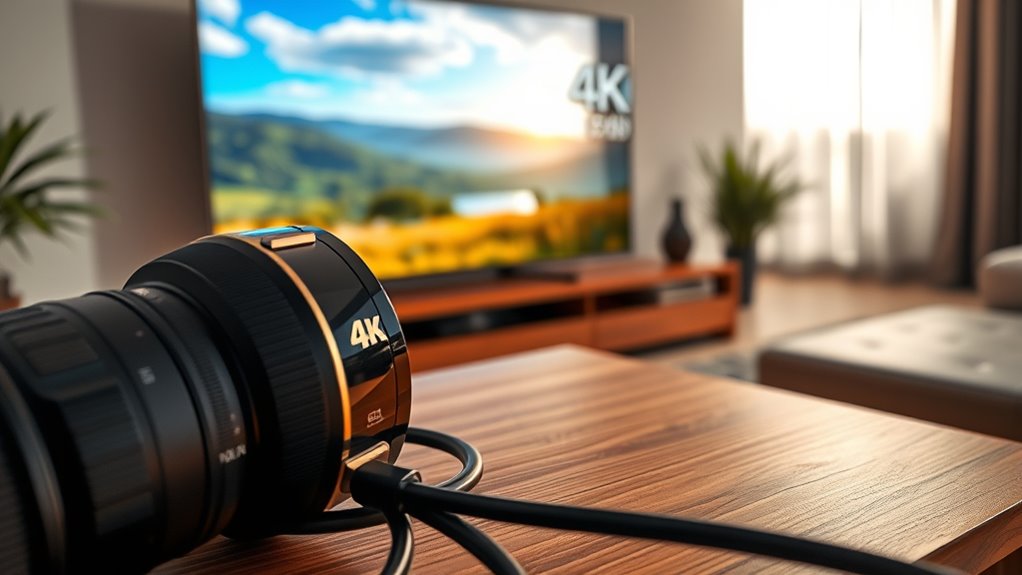
Streaming in 4K requires considerably more data, which can strain your internet connection. You might notice slower speeds or buffering if your bandwidth isn’t enough. Additionally, connection fluctuations can disrupt your viewing experience, making stability a key concern. Recognizing warning signs of a checked-out partner can help you address underlying relationship issues that may also impact your overall well-being. Since high-quality streaming often demands a reliable connection supported by fast internet speeds, ensuring your network can handle these requirements is essential to prevent interruptions. Upgrading your router or switching to a wired connection can also improve network stability, making your viewing experience smoother. Implementing vertical storage solutions can also help optimize your home network setup by reducing clutter and improving device placement for better connectivity.
Increased Data Requirements
As you upgrade to 4K content, your internet connection must handle considerably higher data loads, which can strain your bandwidth. 4K streaming requires roughly four times the data of HD, increasing the demands on your network. To manage this, streaming services use advanced compression techniques that reduce data size without sacrificing quality. Compression techniques are continually refined to maximize efficiency while maintaining visual fidelity. Modern streaming protocols also optimize data transfer, allowing smoother playback despite larger files. Additionally, the use of adaptive streaming dynamically adjusts video quality based on your connection speed, helping to prevent buffering issues. However, even with these efficiencies, your connection needs to be fast and stable enough to support the increased data flow. If your bandwidth isn’t sufficient, you may experience buffering or reduced quality. Additionally, understanding how headphones and other audio devices connect and operate can help you fully enjoy your streaming experience without interruptions. Consequently, understanding how compression techniques and streaming protocols work helps you gauge whether your current internet setup can handle 4K content comfortably.
Potential Connection Fluctuations
Since 4K streaming demands a much higher data rate, any fluctuations in your internet connection can cause noticeable disruptions. Connection stability becomes vital, as even small bandwidth fluctuations can lead to buffering or reduced video quality. If your internet speed dips unexpectedly, your stream may pause or downgrade to lower resolutions, defeating the purpose of 4K. Stable connection ensures smooth playback without interruptions. Factors like network congestion, Wi-Fi interference, or limited bandwidth can cause these fluctuations, making consistent performance difficult. To enjoy 4K content without frustration, you need a reliable internet connection with steady bandwidth. Without this stability, your streaming experience suffers, and the benefits of 4K resolution are compromised. Ensuring a stable connection helps maintain high-quality, uninterrupted viewing. Additionally, using a high-quality projector with good input lag and color accuracy can further enhance your overall viewing experience.
Data Caps and Cost Considerations

While 4K streaming offers stunning visuals, it can also quickly eat into your data cap and increase your monthly costs. If your internet plan has data caps, streaming in 4K might cause you to reach your limit faster, resulting in extra charges or throttled speeds. To understand the cost considerations, consider these points:
- High data usage: Streaming in 4K can consume around 7 GB per hour.
- Monthly impact: If you watch several hours daily, your data cap could be exceeded easily.
- Additional costs: Beyond data limits, some providers charge extra for exceeding caps, adding to your bill.
- Opting for a Gold IRA rollover can be a smart move for long-term financial security, especially if you’re concerned about inflation impacting your savings.
- Being aware of your internet plan limitations and understanding the potential costs can help you decide whether 4K streaming fits your budget and plan. Additionally, understanding the impact on bandwidth can help you manage your usage more effectively, especially when considering fellow streaming services that may have different data requirements. Recognizing data management strategies is essential to optimize your viewing experience without overspending.
Devices and Compatibility for 4K Playback
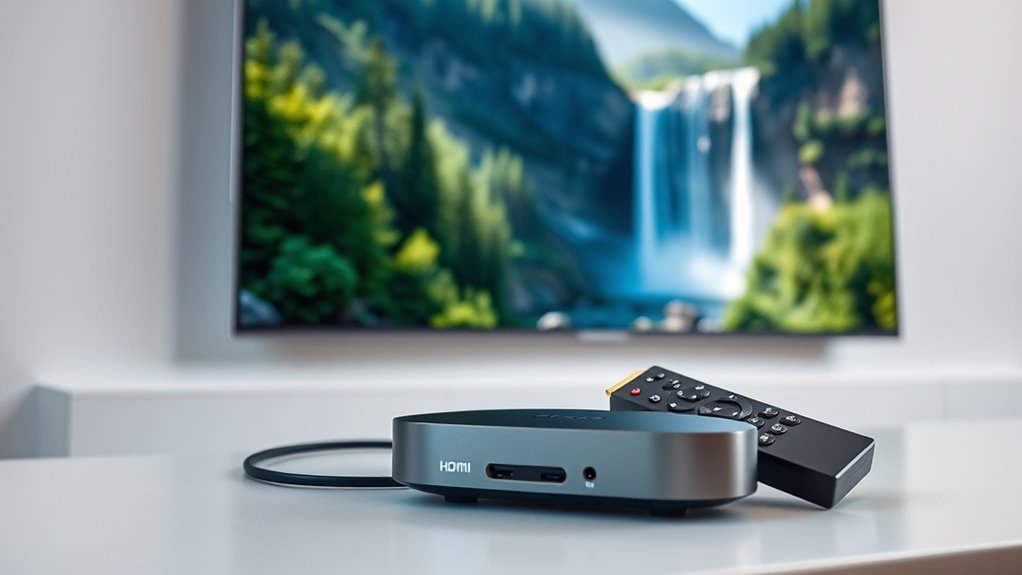
To enjoy 4K streaming, your devices must support the higher resolution and be compatible with the streaming services you use. Device compatibility is vital; not all smart TVs, gaming consoles, or media players can handle 4K content. Check your streaming hardware to confirm it supports 4K output, including HDMI ports that meet the required standards, like HDMI 2.0 or newer. Many streaming devices, such as Roku, Amazon Fire TV, and Apple TV, offer 4K versions, but verify their specifications before purchasing. Your device’s firmware and software updates are also essential for compatibility and peak performance. Without compatible hardware, you won’t be able to enjoy the full benefits of 4K, regardless of your internet speed or data plan.
When Is 4K Streaming Most Valuable?
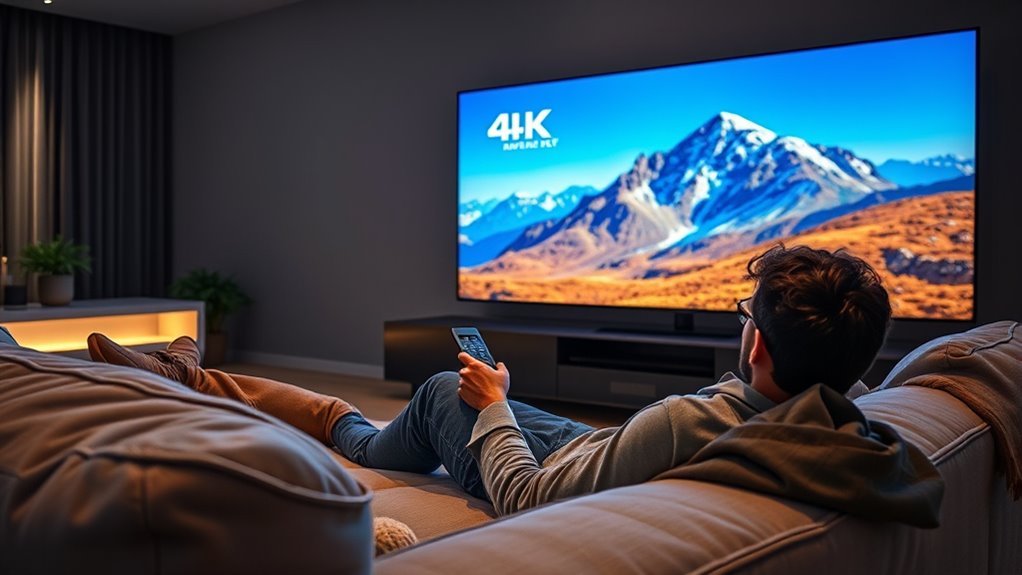
Are you wondering when 4K streaming truly makes a difference? It’s most valuable when your viewing experience relies on sharp detail and vibrant visuals. Consider these moments:
- Watching on a large screen where pixelation would be noticeable.
- Viewing high-action content, like sports or movies, where clarity enhances immersion.
- Setting up a dedicated home theater, aiming for ideal content delivery quality.
- When your device supports advanced on-device AI capabilities, which can optimize streaming quality and enhance viewing experiences.
- Ensuring your internet bandwidth can handle the increased data load without interruptions.
In these cases, bandwidth considerations become critical—higher bandwidth ensures smooth playback without buffering. When your setup emphasizes picture quality over data use, 4K streaming can considerably elevate your experience. However, if your bandwidth is limited or you prioritize data savings, the benefits might not justify the extra bandwidth required. Knowing when 4K truly shines helps you decide if it’s worth the investment.
Making the Decision: Is It Worth the Extra Bandwidth?
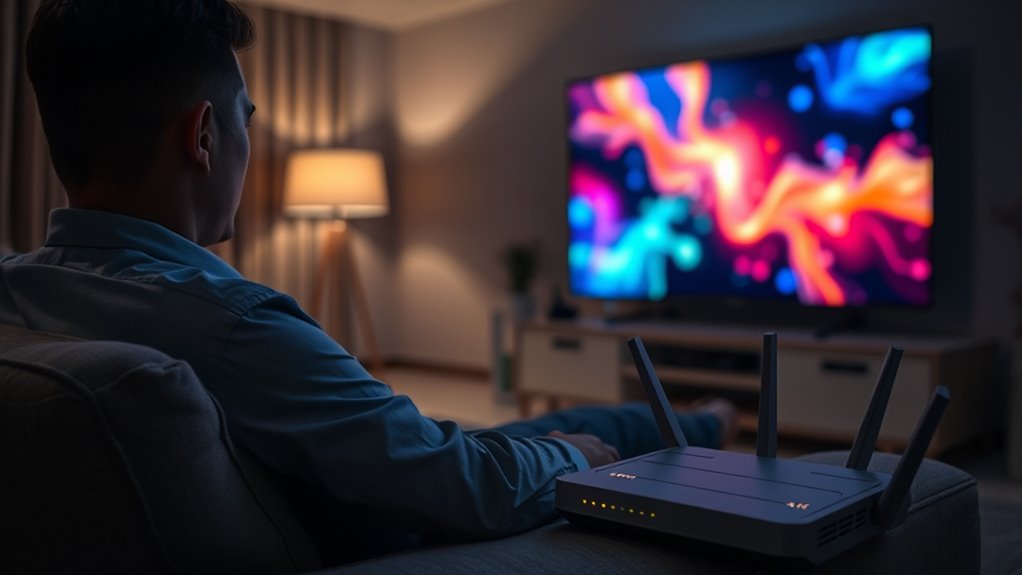
Deciding whether 4K streaming is worth the extra bandwidth depends on your viewing habits and internet setup. If you frequently watch high-resolution content and have sufficient bandwidth, the benefits outweigh the cost implications. However, you should consider device compatibility—does your TV or streaming device support 4K? If not, upgrading might be necessary, adding to expenses.
| Aspect | Consideration |
|---|---|
| Cost implications | Higher data usage may increase internet costs |
| Device compatibility | Ensure your devices support 4K streaming |
| Internet speed | Minimum 25 Mbps recommended for smooth 4K |
| Viewing habits | How often and important is 4K content? |
| Budget | Are upgrades and data costs affordable? |
Frequently Asked Questions
Can My Internet Plan Support Consistent 4K Streaming?
You need to check if your internet plan supports consistent 4K streaming. For smooth playback, your internet speed should be at least 25 Mbps, as 4K streaming has high bandwidth requirements. If your bandwidth isn’t sufficient, you might experience buffering or quality drops. To enjoy 4K content seamlessly, guarantee your internet speed meets or exceeds these requirements and your plan offers enough bandwidth for multiple devices.
Does 4K Streaming Increase Electricity or Device Wear?
Think of your device as a marathon runner—pushing harder can lead to faster wear. Streaming in 4K slightly increases energy consumption, which may heat up your device and potentially affect its longevity over time. However, the impact isn’t drastic unless you stream constantly. To protect your device’s longevity, guarantee proper cooling and avoid prolonged high-resolution streaming. Balance your viewing habits to keep both your entertainment and device in top shape.
Are There Specific Content Types That Benefit Most From 4K?
You’ll find that certain content types, like nature documentaries and sports, benefit most from 4K resolution benefits because they showcase intricate details and vibrant colors. To get the best experience, verify your device and content are compatible with 4K. Not all videos or platforms support high resolution, so check for content compatibility to truly enjoy the enhanced visuals that 4K streaming offers.
How Does 4K Streaming Affect Data Privacy and Security?
You might not realize it, but your 4K streaming impacts your data privacy and security more than you think. Streaming services often use data encryption to protect your information, but it is crucial to review their privacy policies for transparency. When you stream in 4K, your data travels more, increasing exposure risks. Stay vigilant by choosing platforms with strong encryption and clear privacy practices to keep your personal info safe.
Is Upgrading Devices Necessary for Optimal 4K Streaming?
Upgrading devices can be necessary for peak 4K streaming because device compatibility impacts streaming quality. If your current device isn’t compatible with 4K or lacks the processing power, you might experience buffering or lower resolution. To enjoy smooth, high-quality streams, consider upgrading to a device designed for 4K content. This guarantees you get the best streaming quality without interruption, making your viewing experience much more enjoyable.
Conclusion
Ultimately, whether 4K streaming is worth the bandwidth depends on your priorities. If you crave stunning visuals and have a robust internet connection, it’s like upgrading from a sketch to a masterpiece. But if your connection struggles or data caps limit you, sticking with HD might be your best bet. Weigh the visual feast against your internet’s stamina—after all, a beautiful picture is only worth the bandwidth it consumes.















